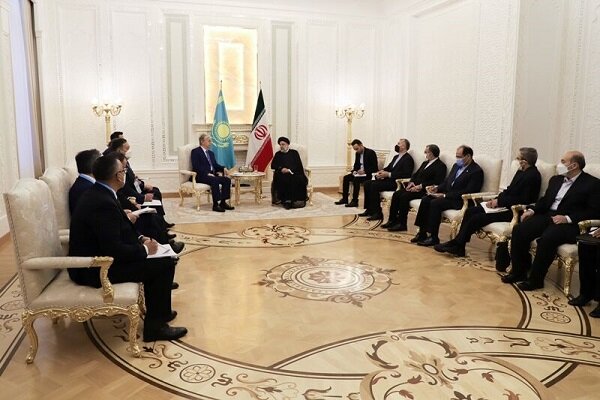Speaking in his meeting with President of Kazakhstan Kassym-Jomart Tokayev on the sidelines of Shanghai Cooperation Organization (SCO) Summit in Tajik capital of Dushanbe on Fri., President Raeisi reiterated that the two countries of Iran and Kazakhstan have shared various and diversified capacities for boosting their ties in all fields especially economic areas.
Launching Iran-Kazakhstan Joint Working Group can help identify and operationalize these capacities within the framework of strategic relations, he added.
Turning to the recent developments in Afghanistan as a common issue for all countries in the region, President Raeisi added that Afghanistan's problems can only be solved by forming an inclusive government with the participation of all political and ethnic groups that can establish peace and stability in this country and avoid foreign interference in Afghanistan.
Elsewhere in his remarks, he pointed to Iran’s nuclear deal, JCPOA, and said that Islamic Republic of Iran is seeking to settle its nuclear standoff through negotiation as it announced earlier that the country does not seek negotiations for negotiations, rather, these negotiations should produce positive results in line with preserving interests of the Iranian nation.
President of Kazakhstan, for his part, expressed readiness of his country to strengthen and improve its relations with the Islamic Republic of Iran especially in economic field.
It should be noted that 21st round of Shanghai Cooperation Organization (SCO) was held in Dushanbe, capital of Tajikistan on Fri. in the presence of 12 member states and observer countries including Islamic Republic of Iran.
The SCO consists of eight permanent member states, including India, Kazakhstan, China, Kyrgyzstan, Pakistan, Russia, and Uzbekistan. Four countries including Afghanistan, Belarus, Mongolia, and Iran are still observer members and six countries of Azerbaijan, Armenia, Cambodia, Nepal, Turkey, and Sri Lanka are dialogue partners.
MA/IRN84473718
